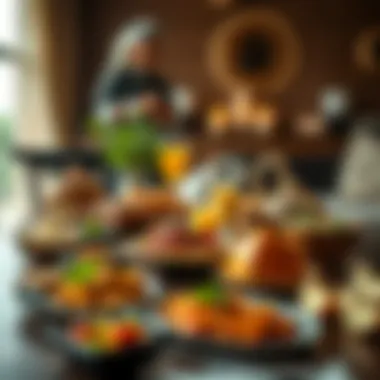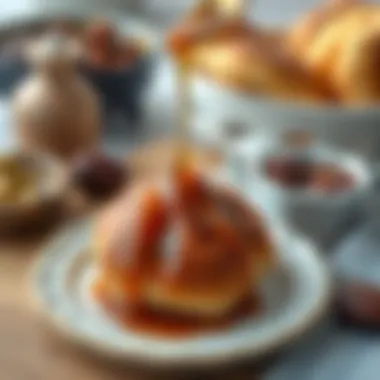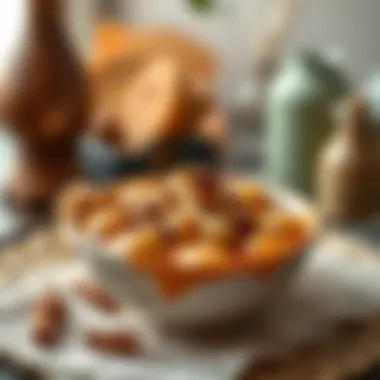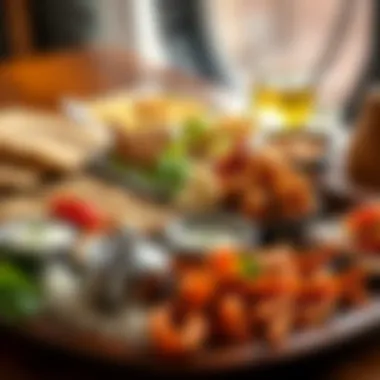Discovering Emirati Traditional Breakfast Delights


Intro
Breakfast in the United Arab Emirates tells a story—one woven with spices, traditions, and the bonds of family and community. It’s more than just a meal; it's a glimpse into the Emirati identity itself. From delectable dishes full of flavor to time-honored rituals around the dining table, each element signifies a deeper connection to the land and the people who inhabit it.
As we embark on this exploration of Emirati traditional breakfast, we’ll examine the unique dishes that adorn breakfast tables, like the much-loved balaleet, a sweet and savory dish made with vermicelli and eggs, or khameer, a fluffy bread perfect for dipping into sauces. Beyond flavors, we’ll unravel the cultural significance of these meals, along with the regional variations that grace different emirates. The importance placed on communal meals highlights values of fellowship and hospitality that are foundational to Emirati life.
The essence of breakfast in the UAE extends beyond food; it lays the groundwork for social bonding and family togetherness. This narrative venture seeks to enrich your understanding and appreciation of these culinary traditions while recognizing their place in today’s diverse society, specifically in the fast-evolving landscape of Dubai. By blending the rich heritage with modern-day influences, Emirati breakfasts symbolize both continuity and change in a society that thrives on its multifaceted identity.
So, prepare your taste buds as we dive into this rich tapestry of culinary art in the heart of the Emirates.
Intro to Emirati Breakfast
When talking about Emirati breakfast, it’s not merely about the food. It is a blend of culture, history, and community—all bundled under the auspices of what starts the day for many in the UAE. Understanding Emirati breakfast involves peeling back layers of tradition to see how diversity and heritage reflect in its dishes. It’s more than just a meal; it’s an experience that speaks to an identity shaped by geography, trade, and nomadic roots.
Historical Context
The historical backdrop of Emirati breakfast is rooted deeply in the traditional lifestyles of the people inhabiting the Arabian Peninsula. For centuries, families relied on the available natural resources and tailored their meals around the climate and the land. Dates have been a staple in the Emirati diet since time immemorial; they provide essential nourishment, and as such, they play a crucial role in breakfast routines. Coffee, traditionally brewed strong with cardamom, was also an obligatory part of hospitality.
With the shifting sands of time, the breakfast table evolved too. The advent of trade in the region not only introduced different spices and ingredients but also forged connections through the way meals were shared. For instance, a traditional spread can feature items that echo influences from neighboring cultures, showcasing a fusion of flavors that have been passed down through generations.
Cultural Significance
The cultural importance of breakfast in the UAE stretches well beyond sustenance. In Emirati households, breakfast is often a social gathering that pulls family members together, whether it’s immediate family or extended relatives, for a meal that signifies togetherness. The act of sharing food brings people closer; it fosters bonds, respect, and unity. Host-guest dynamics play a significant role as well; offering coffee and dates to visitors demonstrates warmth and hospitality, a bedrock of Emirati culture.
Moreover, in today’s fast-paced world, retaining the traditional practices around breakfast has become a means of preserving heritage amidst modernization. While global food influences pervade, many Emiratis pride themselves on their culinary roots and the rituals that come along.
As such, an understanding of Emirati breakfast serves as a window into the broader context of the UAE’s food culture. It showcases how food connects people to their past, aids cultural continuity, and bridges divides in an increasingly cosmopolitan society.
Key Components of a Traditional Breakfast
When we think of breakfast, it’s not just about filling your stomach. In the context of Emirati culture, the morning meal holds a significance that reaches far beyond the plate. It embodies communal values, historical legacy, and deep-rooted traditions woven into the fabric of everyday life in the UAE. The key components of a traditional breakfast serve as a connective thread to the past while evolving to meet contemporary tastes. In this section, we will explore three main elements: Dates and Coffee, Balaleet, and Chickpea-Based Dishes, each playing a pivotal role in this rich culinary landscape.
Dates and Coffee
To start, dates and Arabic coffee are synonymous with Emirati hospitality. These two staples feature prominently in the breakfast spread and symbolize generosity and warmth. Traditionally, the dates are served alongside Arabic coffee—locally known as gahwa, which is often spiced with cardamom and served in a delicate, small cup. This pairing reflects not only a culinary delight but also social etiquette; offering coffee and dates to guests is a warm invitation to share in the morning ritual.
"The act of serving coffee and dates is a ritual that brings people together, emphasizing friendship and respect."
In the UAE, there are different varieties of dates, such as Khadrawy, Ajwa, and Mabroom, each with its unique flavor profile and texture. Dates are naturally sweet and rich in nutrients, making them a wholesome choice for breakfast. The caffeine in coffee also provides that valued lift—bringing energy to the start of the day.
Balaleet: Sweet and Savory
A defining dish in Emirati breakfasts is balaleet, which adds both a sweet and savory twist to the morning meal. This dish is traditionally made from vermicelli noodles sautéed with a blend of spices, sugar, and often topped with a soft, fried egg. It beautifully showcases the flavors that Emirati cuisine is renowned for—enjoying sweet and savory elements side by side.


What makes balaleet particularly enchanting are its layers. The spices, such as saffron and cardamom, elevate the dish to new heights, evoking a deeper connection to familial history and cultural identity. It’s a dish associated with celebration—a cumbersome word, perhaps, which translates to joy and hospitality.
To prepare balaleet, one might follow these steps:
- Sauté Vermicelli: Begin by frying the noodles until golden brown.
- Add Flavors: Add cinnamon, cardamom, and sometimes even a hint of orange zest for that extra zing.
- Mix in Sugar: Fold in sugar to balance the savory notes.
- Finish with Eggs: Top with a gently fried egg before serving.
Each mouthful of balaleet weaves together the threads of tradition, symbolizing the community spirit in which it is often shared.
Chickpea-Based Dishes
Chickpeas hold a revered place in Emirati cuisine, especially during breakfast, where they can be featured in various preparations. One popular dish is chickpea stew, which is typically flavored with cumin, coriander, and garlic. The creamy texture of well-cooked chickpeas provides a delightful contrast to the crispy textures found in other breakfast items.
In addition to stew, chickpeas may also appear as foul medames, a dish made from mashed chickpeas often garnished with fresh parsley, tomatoes, and a drizzle of olive oil. This dish not only provides nourishment but encapsulates the warmth of sharing food together, making it popular for morning gatherings.
These dishes reveal a practical aspect of Emirati breakfast culture—the incorporation of legumes and grains highlights economic resourcefulness. Chickpeas are a filling, protein-rich option that helps sustain energy throughout the day.
In summary, the key components of a traditional Emirati breakfast not only satisfy hunger but also offer a glimpse into a society rich with stories and traditions. From the date's sweetness invoking hospitality to the depths of flavors found in balaleet and chickpea dishes, each aspect enhances the morning rituals that define Emirati culture.
Regional Variations in Breakfast Dishes
The regional variations of breakfast dishes in the UAE demonstrate not only culinary diversity but also the rich cultural tapestry of the federation. Each emirate showcases its own unique character, influenced by the local environment, available ingredients, and historical connections to trade routes. Such differences highlight the importance of understanding not just what is consumed but also the cultural undercurrents that shape these meals. This section sheds light on why exploring these variations is essential in grasping the broader context of Emirati culinary heritage.
Breakfast in Abu Dhabi
In Abu Dhabi, traditional breakfasts embody a blend of flavors that reflect the emirate's historical role as a hub for trade and commerce. The flavors are often influenced by both local and neighboring cuisines. One dish that stands out is shakshuka, a flavorful poached egg dish made with seasoned tomatoes, herbs, and spices. This dish, although originally from North Africa, has found its place in Emirati kitchens, reflecting the melting pot nature of the capital.
Popular accompaniments include fresh pita bread or khameer, which is a bread uniquely characterized by its soft, fluffy texture, perfect for dipping into eggs and sauces.
Abu Dhabi locals take pride in their breakfast traditions, often enjoying their first meal with family or friends, which builds strong social bonds and reinforces community ties.
Breakfast in Dubai
Dubai's breakfast scene is a vibrant mix of old and new. The emirate is known for its internationalism, bringing together flavors from various parts of the world while maintaining its traditional setup. One can't mention breakfast in Dubai without noting harees, a traditional dish made from wheat and meat. It's often served in a light gravy and is especially popular during Ramadan.
Another staple is the Arabic coffee served alongside dates, a combination deeply ingrained in Emirati hospitality. Cafes and eateries throughout the city proudly offer these delights with their unique twists. This is where one also starts to notice influences of modern gastronomy, where traditional dishes meet contemporary culinary techniques, giving rise to fusion breakfast options that are both appealing and innovative.
In addition to all this, the bustling cafes in areas like Jumeirah and Deira often blend local hospitality with a cosmopolitan vibe, offering dishes that cater to both Emiratis and expatriates, further enriching the breakfast experience.
Breakfast in Sharjah
Sharjah, known as the cultural heart of the UAE, maintains a strong allegiance to traditional Emirati fare. Breakfast here often features dishes like foul medames, a mash of fava beans flavored with olive oil, lemon, and spices, served fresh alongside warm bread. This dish showcases the local ingredients often found in Sharjah and highlights the home-cooked feel of the breakfast experience.
The presence of various karak tea stalls also marks Sharjah’s breakfast culture, providing a warm and spiced tea that resonates with the community atmosphere. Families gather around wooden tables in local eateries, sharing meals and stories, often leading to a communal dining atmosphere that cannot be replicated elsewhere.


However, what particularly sets Sharjah apart is its commitment to preserving culinary traditions. Here, one can often find traditional Emirati dishes preserved and celebrated through family recipes that are passed down generations, providing visitors and residents alike with a taste of authentic culture through food.
Recipes for Traditional Breakfast Dishes
In exploring the culinary heritage of Emirati breakfast, the section dedicated to recipes holds a unique significance. This is where tradition intertwines with modern practices in the kitchen, providing both insights and practical knowledge on how to recreate these authentic dishes. Recipes serve as a pathway for individuals to connect with a culture rich in history and flavors. They allow for an exploration of ingredients that have been cherished for generations and techniques that tell stories of community and family gatherings.
Understanding how to prepare these traditional dishes encourages a deeper appreciation not just for the food itself, but also for the cultural values embedded in the act of eating together. Recipes become a linguistic bridge, showing not just how to make a dish, but how to maintain a living tradition.
Preparing Balaleet
Balaleet is a fascinating dish that balances sweetness and savory flavors, emblematic of Emirati cuisine. The origins of this dish stretch back centuries, making it a staple in Emirati breakfast tables. The preparation involves a delicate dance of spices, primarily cardamom, intertwined with sweet vermicelli noodles and a hint of saffron.
To prepare Balaleet, one generally follows these steps:
- Ingredients: Gather vermicelli, sugar, cardamom, saffron, eggs, ghee, and a pinch of salt.
- Cooking Noodles: Boil water and add the vermicelli. Cook until just tender, then drain and set aside.
- Flavoring: In a separate pan, melt ghee over medium heat. Add cardamom pods, allowing them to release their essence. Stir in the cooked noodles and sugar, ensuring everything is well combined.
- Eggs: In a bowl, whisk eggs, adding a tiny bit of salt. Pour this mixture over the noodle mixture in the pan and let it cook gently until the eggs solidify, creating a soft coating.
- Serve: Garnish with fried onions on top to add texture.
The beauty of Balaleet lies not just in its taste but in how it is shared among family and friends, encouraging conversations and strengthening bonds.
Chickpea Stew Recipe
Moving beyond the realm of sweetness, the Chickpea Stew showcases another facet of Emirati breakfast culture. It's hearty, nourishing, and brimming with flavor. This dish speaks to the nutritional heart of the region, where legumes were often a key protein source.
Here’s a straightforward recipe to whip up your own chickpea stew:
- Key Ingredients: You will need canned chickpeas (or soaked dry chickpeas), onions, tomatoes, cumin, coriander, black pepper, garlic, and olive oil.
- Sautéing: Start by heating olive oil in a pot. Add diced onions and sauté until they're golden and fragrant. Toss in the garlic, allowing it to meld into the mix for a minute.
- Adding Flavors: Stir in the diced tomatoes along with cumin, coriander, and black pepper. Let this sauté until the tomatoes break down, forming a thick base.
- Chickpeas: Add your chickpeas to the pot and mix well. If the stew looks too thick, a splash of water will suffice.
- Simmer: Let it simmer on low heat for 15-20 minutes, allowing the flavors to marry beautifully.
- Garnish: Fresh herbs like parsley or cilantro can be thrown on top just before serving, bringing a burst of freshness.
Not only does this dish nourish the body, but it also reflects the cooperative aspect of Emirati culture, with many families often collaborating in the kitchen to prepare such meals for breakfast or larger gatherings.
"A meal shared is a joy multiplied."
These recipes encapsulate the essence of Emirati breakfast, offering a taste of tradition that isn’t just felt on the palate, but lived in the hearts of those who partake in these communal meals.
The Social Aspects of Breakfast
Breakfast in the Emirates transcends mere sustenance; it's a rich reflection of social and family bonds, embodying shared experiences and cultural values. When Emiratis gather around the breakfast table, they engage not only with food but also with the concept of community. This engagement is vital, as it reinforces ties among family members and friends, fostering a sense of belonging that resonates deeply within the culture.
The act of sharing breakfast is often seen as a prelude to more extensive social interactions throughout the day, setting the tone for camaraderie and hospitality. In traditional settings, the preference is to serve a variety of dishes, inviting everyone to partake—a practice that not only showcases the diversity of flavors but also emphasizes inclusivity.
Family Traditions
Breakfast plays a central role in the families of the UAE, often being a time for stories and laughter. Families routinely enjoy meals together, making it a cherished ritual. Each family may have its unique twist on traditional dishes, passed down through generations. For instance, a grandmother's specific way of preparing balaleet or the inclusion of special spices in chickpea stew can carry emotional weight and nostalgia.
Family traditions may also incorporate rituals during breakfast, such as serving guests with utmost respect or reciting verses from the Quran. Such elements imbue the meal with deeper meaning, as they reflect the respect for heritage and the importance of family, turning a simple breakfast into a cultural experience.


Hospitality and Meals
In Emirati culture, hospitality is paramount, and breakfast acts as an extension of this value. Welcoming guests for breakfast is not merely a social obligation but a point of pride. The spread typically includes an array of treats that exemplify generosity, from steaming foul medames to aromatic qatayef. Offering food, especially traditional dishes, signifies not just nourishment but hospitality that warms the heart.
This culture of sharing extends beyond families—when friends drop by unannounced, it’s common to whip up a quick breakfast spread. Offering coffee, dates, or even a plate of freshly baked khameer bread is the norm, fostering an atmosphere of warmth and friendliness.
"In the UAE, breakfast isn't just what you eat; it's who you eat with."
Meals shared over an Emirati breakfast often lead to discussions of significant matters—community news, family updates, or plans for the day ahead. It’s in these moments that connections are fortified, providing a social fabric that underpins the community. This wholesome practice permeates the lifestyle in the UAE, showcasing how ingrained the social aspects of breakfast are in Emirati life.
Ultimately, the traditional breakfast serves as a vibrant storytelling opportunity—a way to share heritage and customs, ensuring that the next generation remains connected to their roots. For investors, homeowners, and anyone interested in the spirit of the UAE, grasping these social nuances can bring valuable context to the local culture and lifestyle. Understanding the essence of breakfast as a social pillar illustrates not only culinary habits but also profound aspects of Emirati identity.
Modern Takes on Traditional Breakfast
As the culinary scene rapidly evolves in the UAE, it's fascinating to observe how Emirati breakfast traditions are adapting to contemporary tastes and lifestyles. Traditional dishes, steeped in history, are being transformed into innovative dining experiences. This blending of the old with the new highlights the resilience and creativity of Emirati chefs and home cooks alike. By merging traditional elements with global influences, they are crafting unique fusion dishes that appeal to both locals and tourists. This confluence not only preserves culinary heritage but also invites a broader audience to appreciate the rich flavors of Emirati cuisine.
Fusion Dishes
Fusion dishes represent a culinary symphony where the old meets the new, creating tantalizing experiences that reflect the multicultural fabric of contemporary Emirati society. For instance, one may find balaleet pancakes, merging the sweetness of traditional balaleet with the fluffiness of a breakfast classic. Another intriguing offering might be shakshuka with spices from the Emirates, infusing the North African dish with local spices like cardamom and saffron.
Here's a quick breakdown of some appealing fusion dishes:
- Hummus Toast: A twist on the popular avocado toast, replacing avocado with creamy hummus, topped with a sprinkle of za'atar and drizzled with olive oil.
- Saffron Omelette: This dish elevates a regular omelette by incorporating aromatic saffron, giving it a beautiful golden hue and a unique flavor.
- Date Smoothie Bowls: Made with blended dates, yogurt, and nuts, garnished with toasted coconut flakes and fresh fruits, these bowls combine health trends with traditional sweetness.
The beauty of these fusion dishes lies not only in their taste but also in how they spark culinary conversations. They create a space where tradition can breathe, evolve, and connect with various cultures, making Emirati breakfast a relevant player on the global dining stage.
Cafes and Restaurants Offering Traditional Breakfast
In recent years, a wave of cafes and restaurants has emerged across the UAE, each presenting Emirati breakfast in tantalizing new ways. This shift is crucial as it fosters a renewed interest in local cuisine, showcasing traditional breakfast options alongside modern interpretations. You can stroll through the bustling streets of Dubai and find charming eateries specializing in authentic dishes like foul medames or khameer bread, all prepared with respect for their roots while adding a contemporary flair.
These establishments not only cater to the taste buds but also propagate the cultural significance of Emirati breakfast. By offering workshops and cooking classes, they engage the community, inviting newcomers and locals to learn about and appreciate their culinary heritage. Here are a few notable spots worth visiting:
- Al Fanar Restaurant & Cafe: Known for its authentic Emirati breakfast, it emphasizes traditional dishes in warm, homely settings.
- Emirati Cuisine: A modern take on local favorites, this restaurant integrates regional flavors with a chic dining experience, attracting a diverse clientele.
- Karak House: A hotspot for the younger crowd, it reimagines the classic karak tea alongside traditional breads, providing a modern café vibe infused with Emirati flavor.
The End: Preserving the Heritage
Preserving the culinary heritage of Emirati traditional breakfast is vital not only for cultural identity but also for fostering community ties in modern society. With globalization and rapid urban development reshaping many cultural landscapes, the importance of maintaining these food traditions becomes even more pronounced. The breakfast table in the UAE is a testament to its history, revealing the ways in which ancestral practices blend seamlessly into contemporary life.
Importance of Traditional Breakfast in Modern Dubai
In bustling Dubai, where skyscrapers reach for the clouds and cultures from around the world converge, Emirati traditional breakfast stands out as a cherished ritual. This meal encompasses more than mere sustenance; it serves as a vital link to the past, helping people in a rapidly changing city remain connected to their roots. By sharing local dishes like balaleet or chickpea stew, families not only nourish their bodies but also pass down stories, history, and values from one generation to the next. The breakfast ritual enhances community bonds, as gathering for this meal is an opportunity to reinforce familial and social ties.
Moreover, as more expatriates and tourists arrive in Dubai, showcasing traditional breakfasts has become an effective avenue for cultural exchange. It provides a platform for locals to introduce their culinary customs to outsiders, thereby enriching the multicultural tapestry of the city. This mutual sharing fosters respect and understanding among diverse populations.
Encouraging Culinary Exploration
To ensure that Emirati traditional breakfasts continue to thrive, it is essential to encourage culinary exploration. Chefs and home cooks alike are starting to innovate, creating contemporary takes on classic dishes that still honor their origins. By experimenting with local ingredients and adding modern twists, new opportunities arise for attracting interest from younger generations who might otherwise drift towards more global cuisines.
Food festivals and community cooking classes can facilitate this exploration, encouraging individuals to delve into the intricacies of these traditional recipes. As the appetite for unique culinary experiences grows, such initiatives can revitalize interest in local dishes, thus preserving them within the broader gastronomic landscape of the UAE.
The integration of sustainability practices in local farming and sourcing ingredients is increasingly becoming a focal point for chefs serious about preserving their heritage while preparing these dishes. Sustainability not only honors the land but also ensures the availability of these cherished foods for future generations.















